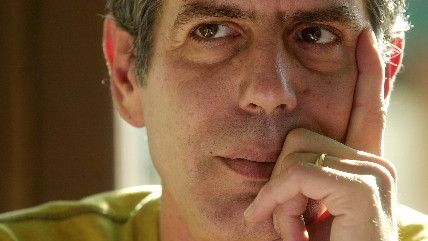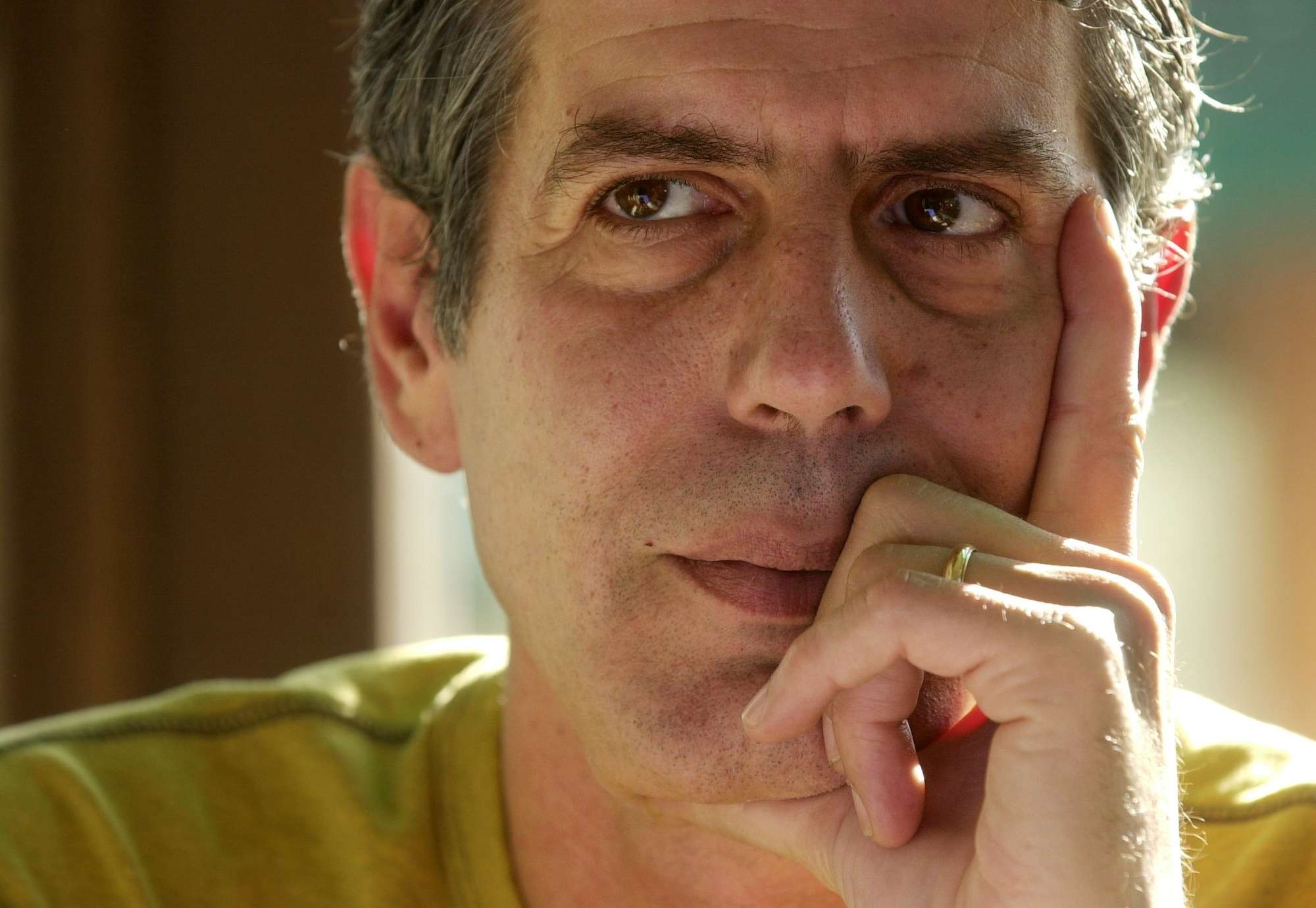Anthony Bourdain on Sichuan Peppers, Sex, Eating Dogs, and Political Correctness
An exclusive post-election interview with the culinary celebrity host of Parts Unknown.


From Iran to to Hanoi to rural New England: Anthony Bourdain's Parts Unknown on CNN has covered a lot of territory, like No Reservations before it. More than 15 years since his best-selling memoir Kitchen Confidential gutted New York's culinary underbelly, the former junkie and chef continues not to give any fucks. Bourdain has also just published Appetites (Ecco), his first cookbook in over a decade, co-authored with longtime collaborator Laurie Woolever.
New Zealand–based writer Alexander Bisley reached the traveler and chef by phone the day after the Electoral College confirmed Donald Trump as president of the United States, and Bourdain talked about how Sichuan peppers are like sex, whether animal-rights activists have any sense of humor, and how the "utter contempt with which privileged Eastern liberals such as myself discuss red-state, gun-country, working-class America as ridiculous and morons and rubes" is a problem.
This interview has been condensed and edited for style and clarity.
Bisley: What concerns you about Trump?
Bourdain: What I am not concerned about with Trump? Wherever one lives in the world right now I wouldn't feel too comfortable about the rise of authoritarianism. I think it's a global trend, and one that should be of concern to everyone.
Bisley: You're a liberal. What should liberals be critiquing their own side for?
Bourdain: There's just so much. I hate the term political correctness, the way in which speech that is found to be unpleasant or offensive is often banned from universities. Which is exactly where speech that is potentially hurtful and offensive should be heard.
The way we demonize comedians for use of language or terminology is unspeakable. Because that's exactly what comedians should be doing, offending and upsetting people, and being offensive. Comedy is there, like art, to make people uncomfortable, and challenge their views, and hopefully have a spirited yet civil argument. If you're a comedian whose bread and butter seems to be language, situations, and jokes that I find racist and offensive, I won't buy tickets to your show or watch you on TV. I will not support you. If people ask me what I think, I will say you suck, and that I think you are racist and offensive. But I'm not going to try to put you out of work. I'm not going to start a boycott, or a hashtag, looking to get you driven out of the business.
The utter contempt with which privileged Eastern liberals such as myself discuss red-state, gun-country, working-class America as ridiculous and morons and rubes is largely responsible for the upswell of rage and contempt and desire to pull down the temple that we're seeing now.
I've spent a lot of time in gun-country, God-fearing America. There are a hell of a lot of nice people out there, who are doing what everyone else in this world is trying to do: the best they can to get by, and take care of themselves and the people they love. When we deny them their basic humanity and legitimacy of their views, however different they may be than ours, when we mock them at every turn, and treat them with contempt, we do no one any good. Nothing nauseates me more than preaching to the converted. The self-congratulatory tone of the privileged left—just repeating and repeating and repeating the outrages of the opposition—this does not win hearts and minds. It doesn't change anyone's opinions. It only solidifies them, and makes things worse for all of us. We should be breaking bread with each other, and finding common ground whenever possible. I fear that is not at all what we've done.
Bisley: In your Brexit episode of Parts Unknown, Ralph Steadman, who illustrated Appetites eye-catching cover, said "I think human beings are still stupid." Does that explain Trump's election?
Bourdain: I don't think we've got the [exclusive] franchise on that. If you look around the world (in the Philippines, in England), the rise of nationalism, the fear of the Other. When people are afraid and feel that their government has failed them they do things that seem completely mad and unreasonable to those of who are perhaps under less pressure. As unhappy and surprised as I am with the outcome, I'm empathetic to the forces that push people towards what I see as an ultimately self-destructive act. Berlusconi, Putin, Duterte, the world is filled with bad choices, made in pressured times.
Bisley: A few years back you were on Real Time with Bill Maher and part of the discussion was about people living inside their own bubbles. What do you think of Bill Maher?
Bourdain: Insufferably smug. Really the worst of the smug, self-congratulatory left. I have a low opinion of him. I did not have an enjoyable experience on his show. Not a show I plan to do again. He's a classic example of the smirking, contemptuous, privileged guy who lives in a bubble. And he is in no way looking to reach outside, or even look outside, of that bubble, in an empathetic way.

Bisley: In your new cookbook, Appetites, you have a section called "Big Fucking Steak." In Kitchen Confidential, you wrote this about vegetarians: "To me, life without veal stock, pork fat, sausage, organ meat, demi-glace, or even stinky cheese is a life not worth living. Vegetarians are the enemy of everything good and decent in the human spirit, and an affront to all I stand for, the pure enjoyment of food."
Bourdain: I can certainly eat vegetarian food in India for a considerable period of time. They actually make good vegetarian dishes. Appetites is a representation of how I cook at home, and my personal preferences, and doesn't pretend to be anything other than that.
That line's the old-school French tradition I came out of. To live without any of those things would be very, very difficult for me. They're all fundamental ingredients. I equate them with joy, pleasure: that's the business chefs are in! We are in the pleasure business. I'm not your doctor, or your therapist.
Bisley: The food-sex connection is enduringly lively in your oeuvre. You recently met that old Chinese guy in Sichuan. Eyes red, clearly in pain, begging for more chili. That was the first time you understood S&M?
Bourdain: Yes. I use a lot of sexual metaphors in describing the food. I don't think you should have food and sex at the same time. I have a limited vocabulary perhaps.
Bisley: You recently gave a feisty response to a long-winded San Francisco animal-rights protester who was going after you about eating meat. You said, "I like dogs. But how much worse can they be than, like, kale?"
Bourdain: At least she had the courage of her convictions. I thought her malice was misplaced. I've never eaten dog. She went on a little long. A sense of humor is a terrible thing to waste. And I think that's the problem with a lot of animal activists, with whom I share a shocking amount of overlap actually. I mean, I'm against shark-finning, I take no pleasure in seeing animals hurt or suffer, I like humanely raised animals. I'm against fast food. I'm against fur, animal testing for cosmetics. What annoys me is these people are so devoid of any sense of humor or irony. And their priorities are so fucked! I mean Aleppo is happening right now. They also threaten to murder humans who piss them off with a regularity I find disturbing.
Bisley: I remember the outer islands of French Polynesia; including meeting lovely indigenous people for whom dog-eating is an occasional traditional practice.
Bourdain: Let's call this criticism what it is: racism. There are a lot of practices from the developing world that I find personally repellent, from my privileged Western point of view. But I don't feel like I have such a moral high ground that I can walk around lecturing people in developing nations on how they should live their lives.
I like to help where I can. If I can minimize the market for shark fin, that would be great. If I could help find a solution for traditional Chinese medicine that values Rhino horn over Viagra I would. I would donate to a fund to distribute Viagra for free in places where they think rhino horn is gonna give you a boner.
The way in which people dismiss whole centuries-old cultures--often older than their own and usually non-white--with just utter contempt aggravates me. People who suggest I shouldn't go to a country like China, look at or film it, because some people eat dog there, I find that racist, frankly. Understand people first: their economic, living situation. I've spent time in the not-so-Democratic Republic of the Congo. The forests there are denuded of any living thing. It's not because they particularly like to eat bush meat, it's because they're incredibly hungry, and seeking to survive.
One thing I constantly found in my travels, which is ignored by animal activism, is that where people live close to the edge, they are struggling to feed their families, and are living under all varieties of pressures that are largely unknown to these activists personally. Where people are suffering, animals who live in their orbit are suffering terribly. In cultures where people don't have the luxury of considering the feelings of a chicken, they tend to treat them rather poorly. Dogs do not live good lives in countries where people are starving and oppressed. Maybe if we spent a little of [our] attention on how humans live, I think as a consequence many of these people would have the luxury to think beyond their immediate needs, like water to drink and wash, and food to live. A little more empathy for human beings to balance out this overweening concern for puppies would be a more moral and effective strategy.
Bisley: That Parts Unknown about the Congo from 2013, on Belgian King Leopold's legacy, gains resonance with references to Heart of Darkness and Apocalypse Now.
Bourdain: This was a genocide that's largely unknown and overlooked! Heart of Darkness and Apocalypse Now are obsessions of mine.
Bisley: Another great episode was set in Iran.
Bourdain: It is a beautiful country, with an ancient and very rich culture that seems often to be at odds with its religious leadership. Iran is deeply conflicted, exhilarating, heartbreaking. One of the exhilarations is Iranians' eagerness to communicate, to express themselves, to show the world more about themselves than what we see on the news. The hospitality from strangers is extraordinary.
Bisley: With all the delicious food on Parts Unknown, people often wonder how you keep in shape. Did those days slogging in uber-hot kitchens give you a speedy metabolism?
Bourdain: No, actually. You look back at those later episodes of No Reservations and The Layover, I was getting bloated with food and alcohol. I train Brazilian ju-jitsu nearly every day. I spend a lot of my time, nearly every day and around the world, working very hard trying not to let some 23-year-old former college wrestler choke me unconscious. That's how I'm in shape.


Show Comments (166)